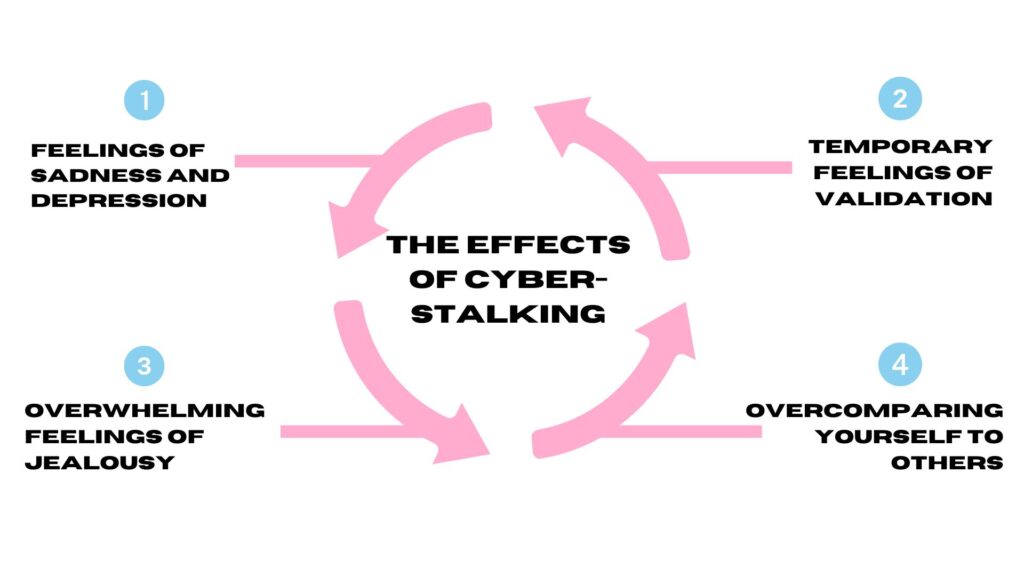Some may consider cyberstalking to be an art. A skill in this digital age. Just to be clear, I’m not talking about cyber-stalking as a crime, but the more innocent act we are all familiar with. We’ve all done it, for different reasons too. Stalking an ex or their new partner, finding out what your boss gets up to on the weekend or, my personal favourite, seeing what people from primary school look like now.
Studies have shown 24% of people check their ex-partner’s social media channels weekly, while 13% admit to doing it daily. That’s according to the Digital PR Agency: Reboot Online.
Calling in from India, relationship psychologist and psychotherapist, Shaurya Gahlawat, loaned some perspective on cyberstalking. Looking into the psyche of cyberstalking we will be diving beyond going through their tagged posts and tweets from 2012 to understanding why women cyberstalk, but more importantly, why we should stop.
I: Hi, Shaurya. Thank you so much for doing this. Would you like to tell the Psych-she readers a little bit about yourself?
I’m Shaurya Gahlawat, a psychologist and psychotherapist specialising in relationships and existentialism. As the founder, chief psychologist, and clinical supervisor of TWS, my group mental health practice, I lead a team dedicated to providing compassionate and effective therapy services. My approach to therapy is rooted in existential philosophy, focusing on the exploration of meaning, purpose, and authenticity in one’s existence.
I: What is cyberstalking?
Cyber-stalking or digital sleuthing involves using online platforms. This can include searching for their social media profiles, browsing through their posts and photos, monitoring their online activity, or even tracking their location through geo tagging features.
I: So, why do women cyber-stalk?
One factor could be related to social and relational dynamics. Women tend to place a higher emphasis on relationships and social connections, and may feel more invested in understanding the behaviours and activities of others in their social circle. I think also women may perceive cyber-stalking as a way to gather information and gain insights into their own relationships or potential interactions with others. There may also be underlying emotional factors at play, such as curiosity, jealousy, insecurity, or a desire for closure or validation.
I: Have any of your clients ever discussed cyber-stalking? What advice have you given them?
Oh, absolutely, in the past I’ve advised women to stop cyber-stalking for their own mental and emotional well-being. I understand it is tempting to engage in cyber-stalking as a means of seeking closure or reassurance, the reality is that it often leads to increased feelings of anxiety, depression, and insecurity. By letting go of the need for external validation and finding fulfilment from within, women are more likely to break free from the cycle of cyber-stalking and reclaim control of their lives. I strongly believe that women deserve to prioritise their mental and emotional well-being above all else. By refraining from cyber-stalking and focusing on self-care, self-love, and personal growth, women can cultivate healthier relationships with themselves and others, leading to greater healing and happiness.
I: What are the negatives of cyberstalking?
While women may believe that cyber-stalking will provide them with answers or a sense of closure, the reality is that it often leads to heightened anxiety, rumination, and emotional distress. Instead of gaining clarity, women may find themselves trapped in a cycle of obsession and self-doubt, unable to move forward with their lives. I’ve had clients struggle with feelings of inadequacy and low self-worth as a result of her cyber-stalking behaviour. Finding yourself constantly comparing her life to the curated images and posts of peers on social media, leading to feelings of jealousy, envy, and despair. A few moments of pleasure isn’t worth going down such a negative spiral.

I: Wow, when you put it that way. Are there any positives?
Honestly, in my experience cyber-stalking may cause temporary feelings of validation or control, but the negative effects far outweigh any perceived benefits.
I: Would you advise women to stop cyberstalking?
Yes I would. I believe stopping cyber-stalking requires a combination of self-awareness, boundary-setting, and healthy coping strategies. Women who engage in cyber-stalking may experience a heightened sense of insecurity and inadequacy as they compare themselves to others and internalise unrealistic standards of beauty, success, or happiness. This constant comparison can erode their self-esteem and fuel feelings of unworthiness or self-doubt. The ability to establish healthy boundaries and maintain emotional autonomy can also be impacted. They may become consumed by their online activities, neglecting their own needs and priorities in favour of monitoring and analysing the lives of others. This lack of boundaries can strain relationships, impair judgement, and hinder growth.
I: How would you advise women to stop cyber-stalking?
My go-to suggestion is to time the internet scrolling. For example, setting aside 15 minutes in the morning and 15 minutes in the evening to scroll, so that it is limited access and guilt- free. Another advice I often give clients is to practise self-awareness and mindfulness when it comes to their online behaviours. By becoming more mindful of their thoughts, feelings, and impulses, clients can learn to recognize when they are engaging in cyber-stalking and develop healthier coping strategies to redirect their attention and focus on their own well-being.
Expert Insight: Shaurya Gahlawat
Shaurya Gahlawat is a psychologist and psychotherapist specialising in relationships. After earning her Masters in Psychology- Counselling from Christ University, Shaurya aims to spread awareness for mental well-being through her work as a mental health influencer. In addition to her social media work she is also the Chief Psychologist at her own clinical practice ,TWS, and a guest professor of Counseling Psychology, where she shares her expertise and passion for the field with future mental health professionals.




